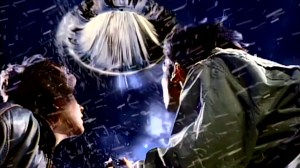There are a lot of feelings in this world you can feel. We remember our first crushes for their unrequited starts and cobbled ends. There are highs and lows and in-between valleys of joy which thread through our lives. There’s the feeling you get when you take a deep breath and let it out with shaky reprieve. You can put a name to the vague feeling which dons when a long-lost friend passes you and doesn’t look back.
Videos by ComicBook.com
In life, feelings are want to run over you at any given time, and director Matoko Shinkai manipulates that truth in the best way with Your Name.
Heralded at the second-coming of Hayao Miyazaki, Shinkai solidified his place as an anime visionary last year with Your Name. The feature film made its debut in Japan and has since overcome all of Studio Ghibli’s films to become the top-grossing anime film of all time. Outsiders have been quick to compare the two artists to one another, pointing out their love for hyper-realism and introspective details. However, after watching Your Name., fans will understand how different Shinkai is from his touted predecessor.
The surface-level summary of Your Name. sounds as fantastical as it is. The film, which was based off a novel Shinkai wrote, tells the rambling story of two crossed teenagers living in Japan. Taki is a high school boy living in the bustle of Tokyo and finds his attractive looks marred by his awkward charms. In a far-off rural town, Mitsuha lives a quaint if not boring life with his younger sister and priestly grandmother. Their lives are all but ordinary until the two begin swapping bodies at random, and a connection suddenly forms.
The first half of Your Name. follows Taki and Mitsuha as they explore their newfound bond. At first, they cannot remember their switches, but the fallout of their random connection cannot be overlooked. The two soon find ways to speak, be it through text diaries or sharpie notes written upon their skin. Taki takes up the unexpected task of bolstering Mitsuha’s spine at school while she helps Taki score a date with his crush. For awhile, everything runs like a gentle rom-com as Taki adjusts to his new breasts and Mitsuha hesitates to use the bathroom.
But, underneath its top-most front, Your Name. leaves lingering dread with its viewers. The film jolts with urgency when Taki discovers he is no longer swapping bodies with Mitsuha. Unlike most of Miyazaki’s work, Your Name. embraces modernity as Taki uses his millennial sleuthing skills to discover what divided his once-fated bond with a girl he’s never met.
To say further would spoil the film’s poignant end, but Your Name. explores direction and criss-crossed plot twists with breathtaking ease. Its surprising temporal take on life weaves magic in every moment, leaving fans wide-eyed by the movie’s mystical take on a mundane world. Shinkai’s eye for realism and dimensional characters forgives the film’s jerky climatic transition. The film perfectly explains why the immediate change is needed, and audiences are left to taste a cosmic tale of bittersweet love.

There is no denying the high-quality animation of Your Name. Dozens of scenes could pass for photographs, and its intricate time-wrap sequences will make artists gawp. The fluid artwork compliments Shinkai’s interlaced story about two strangers who are desperate for more time with one another.
Watching Your Name. will make you feel many things, but the best way to describe its emotional fallout is full. The feature will undoubtedly be ranked amongst the likes of Spirited Away for future film-heads, but its merit is not just defined by the loaded comparison. Your Name. forgoes nostalgia and instead redefines contemporary romances for modern audiences. Your Name. is a film that anime diehards will fall for whilst also converting outsiders. And, when fans finally watch the film’s credits roll through watery eyes, they will feel like watching it a second time.









